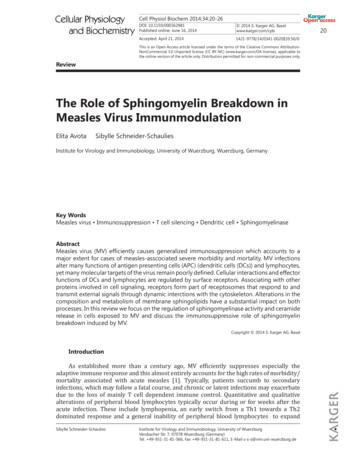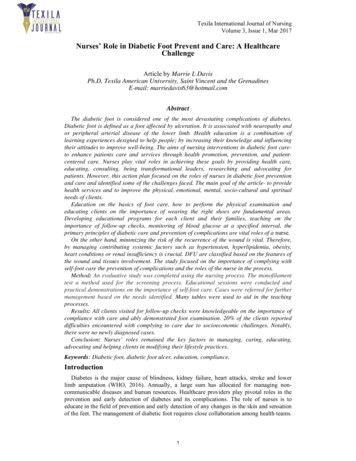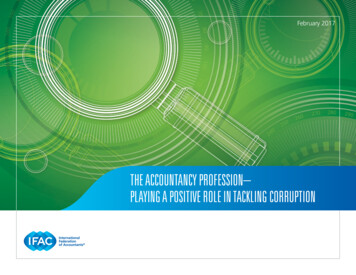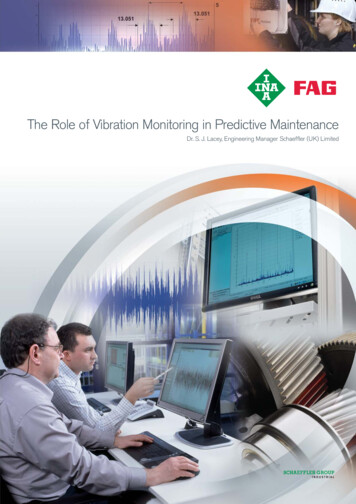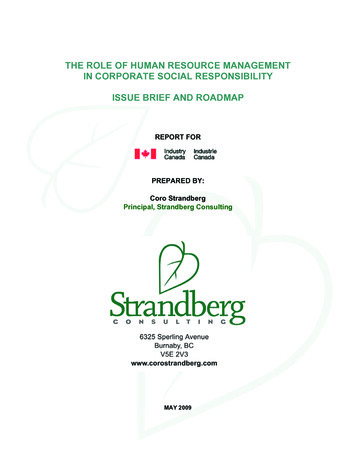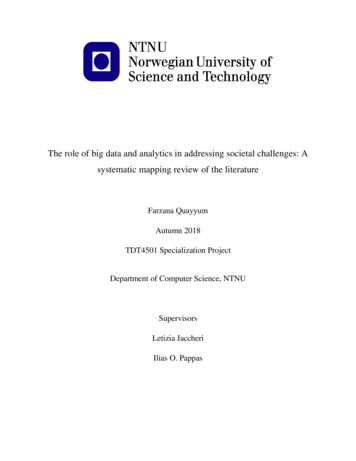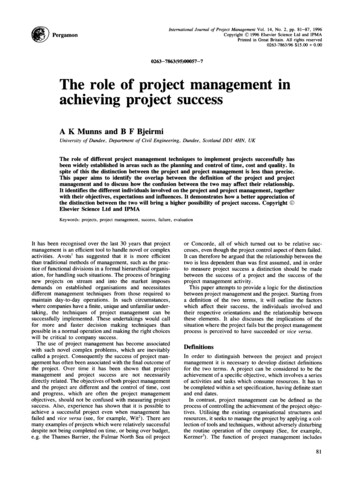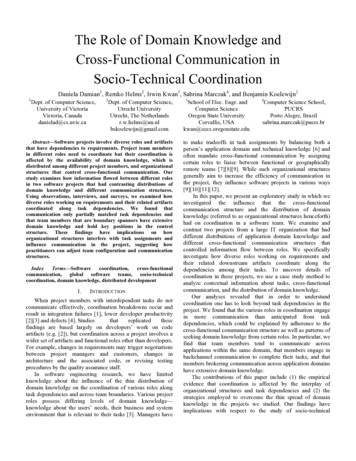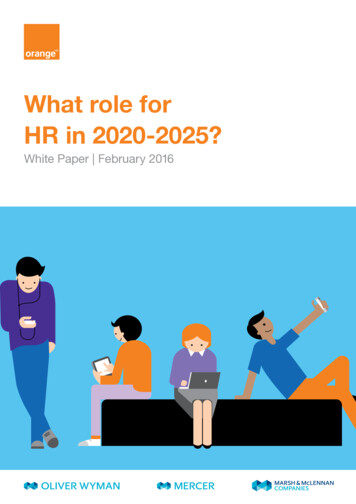
Transcription
What role forHR in 2020-2025?White Paper February 2016
ContentsEditorial31Introduction42Trends affecting human resources52.1 The big generation gap52.2 Values and raison d’être: terms of engagement72.3 Personal development over title, career, company102.4 Employees as customers112.5 Agile, flat, open organizations132.6 The leadership model is evolving to become a cornerstoneof change14Impact on the role of HR163.1 Ensure shared meaning, raison d’être, engagement163.2 Manage different worlds and customize the HR value proposition163.3 Foster personal development and employability173.4 Reinforce the agility and openness of organizationsand work practices193.5 Develop the managerial leadership model203.6 Orange’s vision224Impact on the posture of HR235Impact on the HR community255.1 Emergence of new activities255.2 Transformation of existing activities275.3 Service optimization and digitalization285.4 The new role of local HR2832
EditorialThe digital revolution ushered in a new world - onethat is fast, open, responsive and raises a numberof challenges. This change has a direct impact ontraditional industries, which are being transformed,altering social relationships and the customerexperience. It is true that the stakes are high: in thisnew digital era, the right information will have to beexploited at the right time and in the right place ifthe experience the company’s customers and staffenjoy is to be fully optimised. The world of work isnot immune from this; far from it: faced with the newforms of work that are developing or with the arrivalof collaborative working methods in business, whatmissions will the HR function need to accomplish inorder to deliver a true employee experience?The digital revolution is having a very significantimpact on us, as HR managers. That is why Orangecommissioned this White Paper, which providesanalysis aimed at understanding the new challengesto HR from the digital transformation and majorsocietal changes. How are the occupations, skillsand stances of HR affected by digital? Morebroadly, how can HR evolve its responsibilitiesand strengthen its role as a driver of companytransformation, in a way that reconciles the digitaland the human?This White Paper was co-authored by Orange’sHR teams, Oliver Wyman and Mercer. It includesanalyses from interviews with the heads of HRof large French and international firms, leadingacademics in the fields of management, thehumanities and social sciences, and Orange teams.At Orange, we have already provided a numberof answers to these questions, as part of our“Essentials 2020” strategy, which aims to shapea digital and human employer model and deliversan employee experience commensurate with theexperience we want for our customers. This visionis based on three main principles: maintaining thebalance between economic performance and socialperformance, achieving a successful employeeexperience, and ensuring that all employees havean experience tailored to their priorities.We have also identified three working areasenabling us to put this vision into practice:guaranteeing useful skills for tomorrow, promotingengagement by everyone, and developing newagile ways of working. These three areas are verymuch in line with what we share in this White Paper,which, I hope, will constitute a pool of ideas thatenable us to take our thinking to the next level, andalso to help Orange, and other companies, shapetheir strategy and their transformation of the HRjob lines.Enjoy your reading!Bruno Mettling and Jérôme Barré3
1. IntroductionPredicting the future has never been easy. Great entrepreneurs and researchershave often been mistaken in their estimates, even if they subsequently madeextraordinary strides.Take Bill Gates, who declared in 1981, “No one will ever need more than 637KB ofmemory on a personal computer.” Or Thomas Watson, founder of IBM, declaring in1943, “I think that there is a worldwide market for maybe five computers.” Likewise,Stewart Toy wrote in l’Expansion in 1972, “McDonald’s must convince people toeat with their hands while offering a very limited menu. Will this work in France?Probably not.”Although it is difficult to predict the future, it is still essential to identify andunderstand the basic social, economic and technological tendencies or “megatrends” that will affect businesses in the next ten to twenty years, in order toanticipate and prepare for the ensuing transformations that will need to take placeA paradox of the long-term thinking is the more you try to imagine the future, themore critical become the tasks of the next twelve months to clarify it. Bill Gates alsosaid, “We always overestimate the change that will occur in the next two years, butunderestimate what will happen in the next ten.”The objective of this white paper is thus to understand the mega trends that willtransform the HR function in the next decade in order to deduce how its missions,postures and communities must evolve in consequence.This report is forward thinking and intended to contribute to the rethinking of HR, butdoes not pretend to be exhaustive, or provide universal solutions. The aim is ratherto launch some ideas to feed the thinking of those responsible for transformingbusiness organizations and who are determined to respect the men and women whocompose them as they do so.This white paper is constructed in three parts. Major trends underlying ongoing demographic, technological, sociological andcultural transformations. HR impact in terms of the required demands and transformations of its role,with illustrations by practices already in place at pioneering companies andlarge corporations. The potential reinvention of HR communities to integrate these trends andtheir impact.This white paper was jointly developed by the HR teams of Orange, Oliver Wymanand Mercer, and specifically integrates about thirty discussions with HR directorsfrom large French and global corporations, universities specialized in social, humanand management sciences (see lists in the appendix) as well as Orange teams.We warmly thank them all for their precious collaboration.4
2. Trends affecting human resourcesFor several years now, Oliver Wyman has conducted research on fundamental trends,or “Mega-trends” that will affect businesses over the next twenty years.By comparing these findings with Mercer’s regular studies and the work undertakenfor this white paper, we have identified six trends that will affect human resources in theyears to come.2.1. The big generation gapThe generation between 20 and 35 years of age, known as generation Y, or the“Millennials,” will represent half of the workforce by 2020 and three quartersby 2025.Naturally, companies must understand the specific expectations of the youngpeople composing this new generation: they are committed to companies whoseraison d’être they share; they enjoy working in teams, having fun, and communities;they want to play an active role in their own development; they are not loyal anddream of creating their own start-up.Illustration 1: The big generation gapGeneration Y-the Millennials-will represent half of the workforce by 2020 and three-quarters by 2025Want to be empowered andseek challengeEnjoy teamwork and communitiesnnnnWant continuous feedbacknnWant to play an active role intheir own development; are“learning workers”nnnnAre committed to companies whoseraison d’être they shareMix personal and professional lifennnnAren’t loyal and dream of creatingtheir own start-upnnEmpowered to get things doneAppetite for challengeCollaborativeRecognize communities of talentExpect their managers to give them immediate feedback;demand feedbackWant responses or suggestions in every domain (performance,learning, career development, etc.)Don’t understand the concept of career paths/layersCount on themselves to define their own development pathContext the value of university degrees and higher educationSee themselves more as “learning workers” than knowledge workers”Commit to companies whose raison d’être they shareAren’t satisfied with current compensation modelsDon’t compartmentalize personal and professional lifeThe issue is no longer “work-life balance” but integrating the twoMost have worked at their current company less than three yearsWould like to create their own businessSource: Oliver Wyman analyses, Futureworkplace.com, BNPP ‘La Grande Invazion,’ (The Great Invazion) The Boson Project5
Faced with upcoming generations, their elders remain very active, however,and are prolonging their working life increasingly.Which raises two questions:1. On what points do the old and new generations coincide, and on what points dothey differ or even diametrically oppose one another?2. On what points do new generations (Y and Z) represent radically differentemployee profiles, forcing HR to confront the immense challenge of reinventingits vision, approach and communities?A global study conducted by Mercer in 2015, based on 50,000 employeeresponses, sheds new light on these two questions.Illustration 2: Generation Y-the Millennials-will represent half of theworkforce by 2020 and three-quarters by 2025.Z (1-19)Y (20-35)X (35-49)Baby boomers18-2930-3940-5455 Recognize theirown contributions Developmentopportunities,recognition, accessto mentors Informal workspaces,volunteeringopportunitiesand flexibility Learningopportunitiesextended outsidethe company New recruitingapproaches Access to socialnetworks and hightech tools Save for housing Employer recognitionof their invidualcontributions Career path offeringleadershipopportunities Work-life balance Flexible schedules Save fortheir children’seducation Starting to thinkabout retirement Work hard tobe recognized Save for theirchildren’s education Planningfor retirement Better manage worklife balance Take care ofa relative Want that theirexpertise/experienceto be recognized Planning to leavefor retirement Expect healthcoverage tobe availableon retirement Access to “flexible”work opportunities,meeting educational,professional,volunteering and/orleisure needs Responsibility fordependency is anissue for one-third ofthis segmentSome expectations are common to all segments: predictable rewards, needfor meaningful work, growth opportunities, dignity and respectSource: Mercer HR, Mercer interviewsFrom an analysis of generational expectations, a number of points appear tocoincide across generations:Need for predictable rewards, meaningful work, professional advancementopportunities, and finally dignity and respect. These needs form a common denominatorbridging the different generations.6
Conversely, there are some very real generational differences:1. Factors of engagement, motivation and recognition are not identical. Seniorgenerations expect their expertise and experience to be recognized; the 40-55 yearsegment still believes in working hard to be recognized; 30 to 40 year olds expecttheir employer to recognize their personal contribution; while younger generationsfeel that they are best able to promote their own contributions.2. Work-life balance expectations are very different. For generations Y and Z, thesolution to work-life balance issues is not a compromise or even a reconciliation ofopposites, but rather an interweaving which employers must take into consideration.They simply want to have a “balanced life,” because the line between professionaland personal life is blurred.3. The concept of career path or development is very different and hazier.While previous generations continue to think more in terms of a defined career,generation Y wants to learn and progress continuously. This vision is reflected intheir desire for responsive management in which they are given immediate andcontinuous feedback. This expectation has a major impact on HR, specifically interms of challenging processes based on annual cycles (performance management,compensation campaigns, training programs, etc.). Generation Z digital natives pushthis trend even further with their truly multidimensional identity, multichannel thinking,and need for agility in organizations that continue to be sluggish.4. The impact of national culture is gradually disappearing as newgenerations arrive on the scene. Younger generations not only have theirown set of expectations, but national culture plays almost no part as adifferentiator, while it still does for older generations. One could even go as faras to evoke the existence of a “seventh continent,” inhabited by the Millennials.This observation is driving some global firms to rethink their HR policy aroundsegmented approaches.2.2. Values and raison d’être: termsof engagementBuying into the company vision and its raison d’être is increasingly becomingimperative to get employees engaged. In managing men and women, twoessential human elements must be kept in mind at all times:Initially, man cannot be reduced to Homo Œconomicus. Alongside formalorganizations held together by economic considerations, informal organizations existand are driven by other motivations (dignity, friendship, and meaning). Indeed, theindividual is no longer willing to be reduced to the status of the “economic animal”depicted by Emile Durkheim, then Marcel Mauss. Modern man does not seek tomaximize his personal interest in disregard for the community; he is also moved by7
Man also seeks recognition, and particularly wants to be recognized as a giver.This need for recognition certainly constitutes the most profound and importanthuman drive. Individuals obtain recognition through the virtuous cycle of “giving,receiving, giving back,” as Alain Caillé and Jean-Edouard Grézy put it in theaforementioned essay. Selflessness and freedom are an integral part of the humanpsyche, of which giving is the clearest expression.It is essential for companies to understand and integrate these two impacts,i.e. the refusal of individuals to be reduced to mere economic animals andthe need to give to obtain recognition, a
This white paper was jointly developed by the HR teams of Orange, Oliver Wyman and Mercer, and specifically integrates about thirty discussions with HR directors from large French and global corporations, universities specialized in social, human and management sciences (see lists in the appendix) as well as Orange teams. We warmly thank them all for their precious collaboration.
